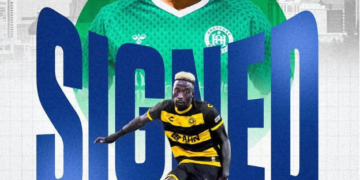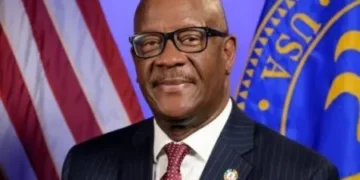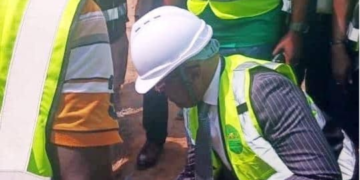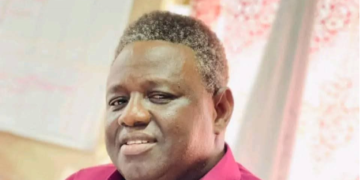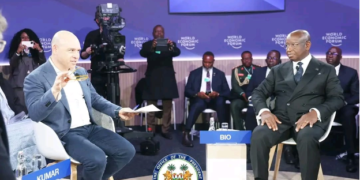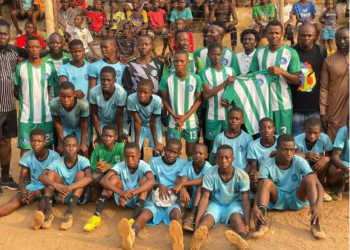By Alpha Amadu Jalloh
Mr. President, yesterday I was in a rush. However, given that our meetings have become a daily occurrence, I decided to pause until this morning, allowing myself time to rest and reflect on the issues I raised previously. In that brief interval, I found my thoughts swirling around the same pressing concerns that weigh heavily on the hearts of countless Sierra Leoneans. Today, I talk not only as a citizen but as one deeply troubled by the state of our nation, a nation where power and privilege seem to be the currency of the few, while the many continue to struggle in abject poverty.
Yesterday, while trying to engage in constructive dialogue, I was heckled by some of your minions. These individuals whom you refer to as your loyal supporters brandish titles like “PaOpa Sojas,” a self-appointed label that, in my eyes, reeks of a misplaced and almost manic zealotry. Mr. President, I cannot help but ask: What have you done to these people? Their behaviour, marked by erratic outbursts and a fanatical defense of your policies, suggests that something is amiss in the way loyalty is nurtured within your inner circle. Is it possible that their fervor is not born out of genuine patriotism, but rather of a coercive system that rewards blind allegiance and punishes critical thought?
Furthermore, I find myself troubled by the emergence of a group calling itself SAB, a supposed media group of bloggers who parade as champions of free speech. Mr. President, one must wonder: Did this group undergo the due process of registration and oversight by the Independent Media Commission, the body designed to monitor and ensure accountability among media houses? The public deserves to know whether such groups operate within the framework of transparency or if they, too, are part of a larger scheme to manipulate public discourse and silence dissenting voices.
My concerns do not end there. A matter that has left the nation in a state of murky confusion is your refusal to address the nation regarding the Jos Leijdekkers saga, a controversy that has, in many ways, symbolized the deep entanglements of personal relationships and state affairs. More specifically, there are questions surrounding your daughter’s involvement with Mr. Leijdekkers. Mr. President, “Na True Sae Na Yu Born Agnes Bio, But Agnes Bio Na Wi Ol Pekin, Aw Yu Go Gi Am to Man Wi nor Kno.” In plain terms, the relationship between your daughter and Mr. Leijdekkers is a subject that calls for clarity. How is it that in a nation where trust in leadership is already tenuous, such personal matters are allowed to blur the lines between private interest and public responsibility?
It is impossible to ignore the pattern emerging within your own family. Mr. President, it appears that wherever one looks, a member of your family seems to be involved in positions of influence. Your daughter serves as a member of the diplomatic corps at the United Nations Security Council, an institution meant to uphold global justice and peace. Your sister holds the esteemed position of Ambassador of Sierra Leone in Türkiye, a role that should embody the highest ideals of diplomacy and national representation. Then there is your nephew, or, as some would argue, your cousin, Yakuba Bio at the Sierra Leone Port and Harbour Authority (SLPHA). Not to mention your former wife, Zainab Kandeh, who is now stationed at the Sierra Leone Embassy in Casablanca, Morocco. Each appointment, each role, raises critical questions about merit, transparency, and the undue concentration of power within a single familial network.
And yet, the list of concerns grows even longer. Consider Admire Bio, whose name has repeatedly surfaced amid accusations of importing illicit substances, specifically KUSH, into Sierra Leone. How does someone with such allegations manage to retain influence in a country that desperately needs leaders committed to upholding the law? Similarly, Cecilia Bio’s financial success has been a topic of heated debate. Where did the millions she flaunts come from? In a nation where the average Sierra Leonean struggles for every basic necessity, such unexplained wealth casts a dark shadow over the integrity of your administration.
But the questions do not end with personal wealth and questionable appointments. There are projects intended to serve the public good that have instead become entangled in controversy. Your wife’s “HANDS OFF OUR GIRLS PROJECT” was launched with the noble intent of safeguarding the rights and dignity of our girls. Yet, Mr. President, the public remains in the dark about the fate of the funds raised for this important cause. What became of the money that was entrusted to you and your family to ensure the safety and empowerment of our most vulnerable? Transparency in such matters is not a luxury; it is a necessity for any government that claims to serve its people.
Then there is the matter of Babadi Kamara, a man who, out of goodwill, has reportedly spent an astonishing six million dollars to build a stadium among other projects. Mr. President, we must ask: Where is this money coming from? In an era when many Sierra Leoneans can barely afford to feed their families, such lavish expenditures demand an explanation. It is not enough to simply celebrate the construction of grand edifices when the very fabric of our society is fraying under the weight of inequality and corruption. Every dollar that is funneled into projects that do not directly alleviate the suffering of the common people becomes a symbol of the misdirected priorities of those in power.
These questions are not mere grievances; they are reflective of a deeper malaise that afflicts our nation. Sierra Leone, a country once rich in promise and potential, now finds itself mired in a system where power is concentrated in the hands of a few, while the majority languish in poverty and despair. The stark contrast between the opulence displayed by those close to you and the daily struggles of the average Sierra Leonean is not just a matter of policy; it is a matter of integrity, ethics, and ultimately, justice.
Mr. President, it is no secret that the lives of the Sierra Leonean people are marked by hardship. Many have been forced to sacrifice their dignity just to survive in a society where wealth is hoarded by a select few. The rampant inequality that plagues our nation has eroded the very sense of integrity that should bind us together as a people. When leaders, especially those at the pinnacle of power, engage in the practices of nepotism and corruption, they not only betray the trust placed in them but also undermine the social contract that is essential for any thriving democracy.
Mr. President. I am reminded here of the infamous Governor Clarkson’s Prayer, a symbolic reminder of accountability and a call for justice that seems to have been all but forgotten. Mr. President, I know you would prefer not to hear the echoes of that prayer, but in light of the issues we face today, it is a necessary invocation. The Governor Clarkson’s Prayer is more than just a historical footnote; it is a moral compass that beckons us to hold our leaders accountable for their actions. It is in this spirit that I must place you, along with your family, friends, and enablers, in what I refer to as the “Crosshairs of Governor Clarkson’s Prayer.” This is not a mere insult; it is a call for a reckoning, a demand that those who have misused their positions for personal gain must answer for their actions.
Mr. President, our nation stands at a crossroads. The decisions you make in the coming days will determine whether Sierra Leone continues on its current path of inequality and corruption or whether we chart a new course, one where transparency, accountability, and genuine service to the people are not just lofty ideals but the very foundations of governance. The issues I raise today are not isolated incidents or the result of isolated individuals; they are symptomatic of a broader malaise that threatens the very soul of our nation.
The Sierra Leonean people deserve more than empty promises and half-hearted apologies. We deserve a leadership that is committed to the welfare of all its citizens, a leadership that does not shy away from addressing the uncomfortable truths that lie at the heart of our national crisis. Whether it is the unchecked loyalty of the so-called PaOpa Sojas, the questionable legitimacy of media groups like SAB, or the murky finances behind projects and appointments, every issue must be scrutinized with rigor and honesty.
I urge you, Mr. President, to take this opportunity to reflect on the state of our nation and the legacy you wish to leave behind. The time has come for an open and honest dialogue, one that cuts through the obfuscation and demands accountability at every level. Sierra Leone is not a playground for the elite; it is the home of millions who look to their leaders for guidance, support, and hope. It is your duty to restore that hope by demonstrating a commitment to justice, transparency, and the true spirit of public service.
Mr. President, this is not merely a personal grievance; it is a call from the heart of our nation. The issues I have raised today are a mirror reflecting the struggles, frustrations, and aspirations of countless Sierra Leoneans. We implore you to address these concerns directly and to take meaningful steps to ensure that our government serves the people, not the privileged few. The path forward is not an easy one, but it is one that must be taken if Sierra Leone is to rise above the challenges of corruption and inequality. Mr. President, can we talk? Can we have a candid conversation about the state of our nation, the responsibilities of leadership, and the urgent need for reform? The time for silence and obfuscation is over. Let this be a turning point, a moment when we choose integrity over indulgence, accountability over apathy, and unity over division. The people of Sierra Leone deserve nothing less.


